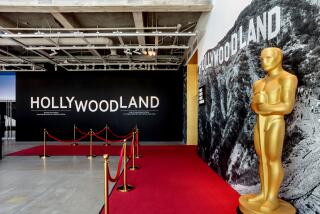‘Schindler’ Stars in Tolerance Lessons
- Share via
After watching the film “Schindler’s List” for a class recently, Hollywood High School senior Narine Kitapszyan said, “It was very touching. I’ve seen this through my own culture.”
Kitapszyan isn’t Jewish or German -- she’s Armenian. She said the experiences of the Jews in the Holocaust paralleled what happened during the Armenian-Turkish conflict of the early 20th century.
Like hundreds of other Los Angeles Unified School District high school students of all backgrounds, Kitapszyan was at the Hollywood American Legion auditorium last week to share her observations about the film and the Holocaust at a town hall meeting with the film’s director, Steven Spielberg.
“I’m known for films that are more entertaining than thought-provoking,” said Spielberg, who fielded questions from students on the award-winning 1993 film, which took home seven Academy Awards, including best picture and best director.
Students had seen the film, many for the first time, on the district’s educational station, KLCS.
“It was a very powerful movie,” said Banning High School sophomore Carmen Chavez. “When you read the book and see the numbers, you still don’t fully understand. It’s a good idea for classes, as long as students can see how they could be affected by something like” the Holocaust, she said.
The students were interested in everything from Spielberg’s favorite scene in the movie to how many of the Jews that Oskar Schindler helped save are still alive.
They didn’t know that one was in the audience.
Leon Leyson was a child when he and his family were sent to Auschwitz, but he told the students he remembered the camp and Schindler.
“If you’re asking me if ‘Schindler’s List’ had an effect on my life, it certainly did. What you have seen is almost a documentary of the experience we had,” he said. “When I saw the movie, I was startled at how accurate it was. I could see my house, where I used to live.”
Leyson said it was the film that moved him to speak to students about his experience after having said nothing for decades. He said high school students are more than qualified to handle the subject.
“If you think students wouldn’t understand, you’d be amazed,” he said. “And they’ll be able to tell their grandchildren they actually saw a man who was on Schindler’s list.”
Many teachers in the district incorporated the film into their classes about tolerance and social justice this year.
“Many of our students have experienced mankind’s hatred for themselves,” said Diane Jackson, an honors English teacher at Washington Preparatory High School in South Los Angeles. “It’s not a big leap to get some of these students to feel this film.”
“We have to trust young kids with difficult history -- its triumphs and its failures,” he said.
Sophomore Jamila Gomez, one of Jackson’s students, sat only a few seats away from Leyson. She asked him what his first thoughts were after he was freed from the concentration camp.
“I will admit to being hungry,” Leyson said.
Gomez asked Leyson to autograph her program and said she was honored to be so close to someone who was a part of history.
More to Read
Only good movies
Get the Indie Focus newsletter, Mark Olsen's weekly guide to the world of cinema.
You may occasionally receive promotional content from the Los Angeles Times.








